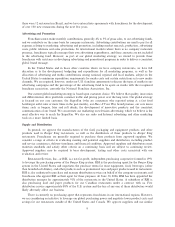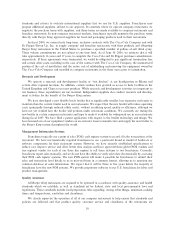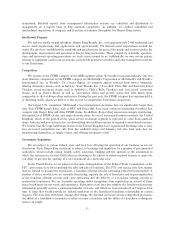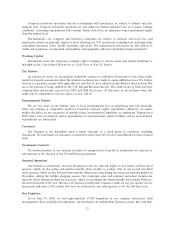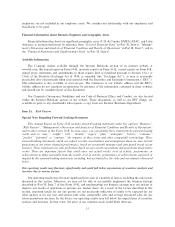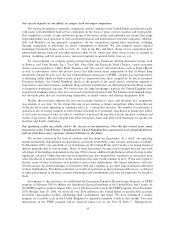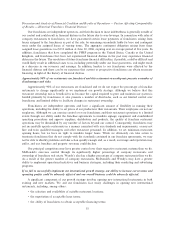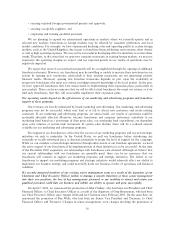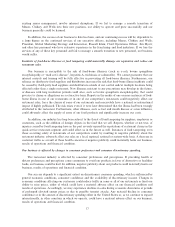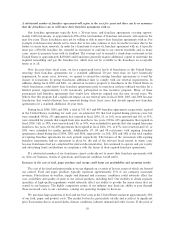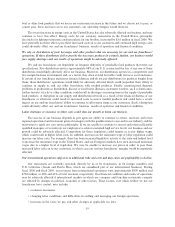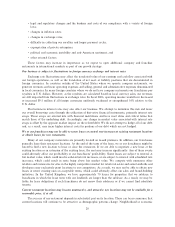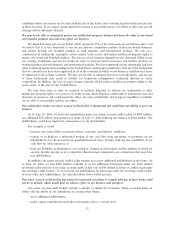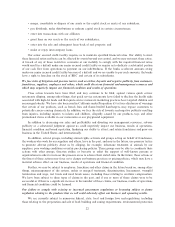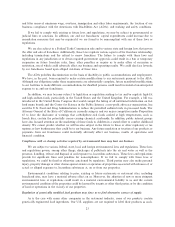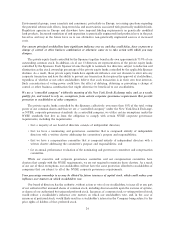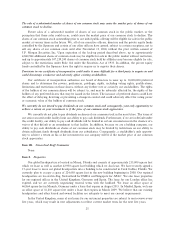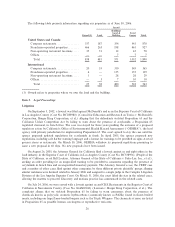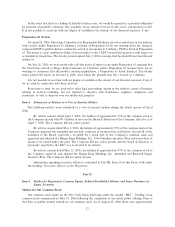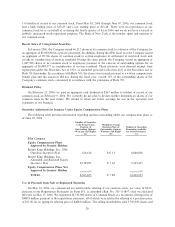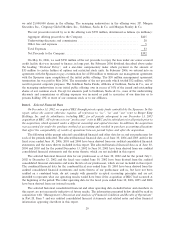Burger King 2006 Annual Report Download - page 31
Download and view the complete annual report
Please find page 31 of the 2006 Burger King annual report below. You can navigate through the pages in the report by either clicking on the pages listed below, or by using the keyword search tool below to find specific information within the annual report.beef or other food products that we use in our restaurants increase in the future and we choose not to pass, or
cannot pass, these increases on to our customers, our operating margins would decrease.
The recent increase in energy costs in the United States has also adversely affected our business and may
continue to have this effect. Energy costs for our company restaurants in the United States, principally
electricity for lighting restaurants and natural gas for our broilers, increased by $3.6 million in fiscal 2006. We
have generally not been able to pass these increased costs on to our customers and continued high energy costs
could adversely affect our and our franchisees' business, results of operation and financial condition.
We rely on distributors of food, beverages and other products that are necessary for our and our franchisees'
operations. If these distributors fail to provide the necessary products in a timely fashion, our business would
face supply shortages and our results of operations might be adversely affected.
We and our franchisees are dependent on frequent deliveries of perishable food products that meet our
specifications. Five distributors service approximately 88% of our U.S. system and the loss of any one of these
distributors would likely adversely affect our business. Moreover, our distributors operate in a competitive and
low-margin business environment and, as a result, they often extend favorable credit terms to our franchisees.
If certain of our franchisees experience financial distress and do not pay distributors for products bought from
them, those distributors' operations would likely be adversely affected which could jeopardize their ability to
continue to supply us and our other franchisees with needed products. Finally, unanticipated demand,
problems in production or distribution, disease or food-borne illnesses, inclement weather, such as hurricanes,
further terrorist attacks or other conditions could result in shortages or interruptions in the supply of perishable
food products. A disruption in our supply and distribution network as a result of the financial distress of our
franchisees or otherwise could result in increased costs to source needed products and could have a severe
impact on our and our franchisees' ability to continue to offer menu items to our customers. Such a disruption
could adversely affect our and our franchisees' business, results of operation and financial condition.
Labor shortages or increases in labor costs could slow our growth or harm our business.
The success of our business depends in part upon our ability to continue to attract, motivate and retain
regional operational and restaurant general managers with the qualifications to succeed in our industry and the
motivation to apply our core service philosophy. If we are unable to continue to recruit and retain sufficiently
qualified managers or to motivate our employees to achieve sustained high service levels, our business and our
growth could be adversely affected. Competition for these employees could require us to pay higher wages
which could result in higher labor costs. In addition, increases in the minimum wage or labor regulation could
increase our labor costs. For example, there has been increased legislative activity at the state and federal level
to increase the minimum wage in the United States, and our European markets have seen increased minimum
wages due to a higher level of regulation. We may be unable to increase our prices in order to pass these
increased labor costs on to our customers, in which case our and our franchisees' margins would be negatively
affected.
Our international operations subject us to additional risks and costs and may cause our profitability to decline.
Our restaurants are currently operated, directly by us or by franchisees, in 64 foreign countries and
U.S. territories (Guam and Puerto Rico, which are considered part of our international business). During
fiscal 2006 and fiscal 2005, our revenues from international operations were approximately $809 million and
$794 million, or 40% and 41% of total revenues, respectively. Our financial condition and results of operations
may be adversely affected if international markets in which our company and franchise restaurants compete
are affected by changes in political, economic or other factors. These factors, over which neither we nor our
franchisees have control, may include:
‚ economic recessions;
‚ changing labor conditions and difficulties in staffing and managing our foreign operations;
‚ increases in the taxes we pay and other changes in applicable tax laws;
19


